Structured practice plans are essential for youth flag football, focusing on skill development, teamwork, and game preparation through drills and age-specific strategies.
Overview of Youth Flag Football
Youth flag football is a non-contact, fast-paced version of traditional football, played 5-on-5, focusing on fundamental skills like passing, catching, and flag pulling. It emphasizes safety, making it an ideal introduction to the sport for young athletes. The game promotes physical activity, teamwork, and strategic thinking while minimizing injury risks. Popular among kids, it serves as a developmental platform, teaching essential football concepts in a fun and engaging environment. Its accessibility and focus on skill-building make it a cornerstone of youth sports programs worldwide.
Importance of Structured Practice Plans
Structured practice plans are crucial for maximizing efficiency and engagement in youth flag football. They ensure players build foundational skills, prepare for game scenarios, and stay safe. A well-organized plan keeps young athletes focused, fostering a balance between fun and learning. By prioritizing key drills and activities, coaches can address individual needs while promoting teamwork. Consistent practice routines also help players develop discipline and confidence, leading to continuous improvement and a lifelong love for the sport.

Components of a Successful Practice Plan
A successful plan includes warm-ups, skill drills, scrimmages, and cool-downs, ensuring a balanced approach to development, safety, and fun for young athletes.

Warm-Up and Stretching Routines
A proper warm-up and stretching routine are crucial for youth flag football practices. Begin with light jogging or dynamic stretches to increase heart rates and flexibility. Incorporate exercises like high knees, leg swings, and arm circles to prepare muscles for activity. Focus on major muscle groups, including hamstrings, quads, and calves, to prevent injuries. Static stretches, such as hamstring and quadriceps stretches, should be held for 15-20 seconds each. End with sport-specific movements, like zigzag runs or shuttle drills, to transition smoothly into skill work. This routine ensures players are physically and mentally ready for practice.
Skill Development Drills
Skill development drills are the backbone of effective youth flag football practices. Focus on ball handling with handoff and passing exercises, ensuring players master fundamentals. Incorporate flag-pulling techniques, teaching defenders proper angles and strategies to tag opponents. Running back drills, such as spin and juke moves, enhance agility and evasion skills. Quarterback drills, like rapid-fire throws, improve accuracy and decision-making. These exercises, tailored to age groups, build confidence and prepare players for game-like scenarios, fostering overall team improvement and readiness for competition.
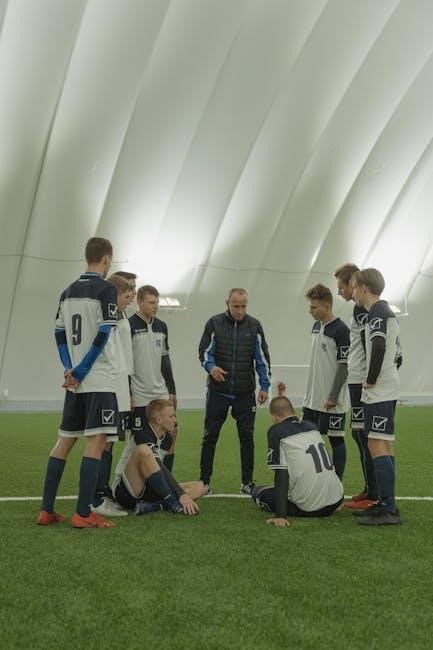
Scrimmage and Game-Like Situations
Scrimmage and game-like situations simulate real-game conditions, allowing players to apply skills in practical scenarios. Drills like the Running Back Corner Drill and small-sided games help players practice flag pulling, ball handling, and decision-making. These exercises foster teamwork, adaptability, and strategic thinking, preparing athletes for the intensity of actual competition. By replicating game environments, coaches ensure players are ready to perform under pressure, enhancing their ability to execute plays and respond to dynamic situations effectively.
Cool Down and Review
A proper cool down after practice helps prevent injuries and promotes recovery. Include light stretching and cardio to gradually lower heart rates. Review key takeaways from the session, emphasizing improvements and areas for growth. Encourage players to reflect on their performance and ask questions. End with positive reinforcement and a preview of the next practice’s focus. This structured approach ensures players leave with a clear understanding of their progress and motivation to improve.
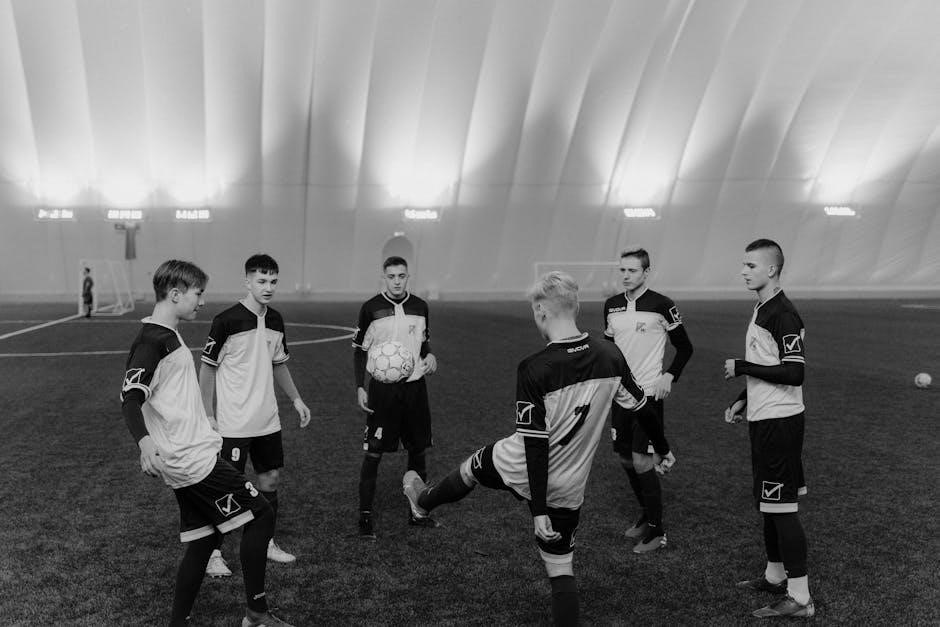
Offensive Strategies and Drills
Mastering fundamental offensive skills like ball handling, passing, and running plays is crucial. Drills focusing on these areas enhance teamwork and game readiness in youth flag football.
Ball Handling and Handoffs
Effective ball handling and handoffs are foundational skills in youth flag football. Drills like the “Toss/Hand-off Drill” and “Team Handoff” activity help players master secure handoffs and ball control. These exercises emphasize proper grip, stance, and coordination. Coaches should encourage players to practice handoffs in dynamic scenarios, simulating game-like situations. Age-specific adjustments ensure younger players focus on basics, while older athletes refine advanced techniques. Consistent practice builds confidence and reduces turnovers, essential for a strong offensive performance. These drills are integral to developing a cohesive and skilled team. Proper execution enhances overall gameplay efficiency and strategy.
Passing Techniques and Routes
Mastering passing techniques and routes is crucial for youth flag football success. Coaches should emphasize proper grip, throwing mechanics, and accuracy drills. Route running exercises, such as slants and outs, help receivers develop timing and precision. Quarterbacks benefit from rapid-fire drills with multiple balls to improve decision-making. Age-specific adjustments ensure younger players focus on basic routes, while older athletes refine complex patterns. These skills, practiced through dynamic drills, enhance offensive execution and teamwork, giving players a competitive edge in game situations. Consistent practice builds confidence and sharpens overall performance. Proper technique ensures safe and effective play.
Running Plays and Agility Drills
Running plays and agility drills are vital for developing speed, agility, and evasion skills in youth flag football. Drills like the “Running Back Corner Drill” and “Spin and Juke Moves” help players navigate defenders effectively. Using cones or ladders, athletes practice weaving through obstacles, enhancing their footwork and quick changes of direction. These exercises simulate game-like scenarios, preparing players to dodge flag pulls and maintain possession. Regular agility training improves overall athleticism, ensuring players are well-prepared for the demands of the game. Proper technique and safety are emphasized to prevent injuries during high-intensity drills. Consistent practice builds confidence and agility, essential for success on the field.

Defensive Strategies and Drills
Defensive strategies focus on flag pulling, positioning, and reaction drills to prepare players for game-like scenarios, emphasizing proper angles and safe techniques to minimize contact.
Flag Pulling Techniques
Flag pulling techniques are crucial for defensive success in youth flag football. Drills focus on proper hand placement, quick reactions, and safe pulling methods to avoid contact. Players practice approaching ball carriers at correct angles, ensuring minimal force while effectively removing flags. Coaches emphasize staying balanced and using both hands to pull flags gently but firmly. These techniques prepare defenders for game-like scenarios, teaching them to prioritize safety while mastering the fundamentals of flag football defense.
Defensive Positioning and Angles
Defensive positioning and angles are vital for youth flag football players to effectively guard opponents. Coaches teach players to read the offense, anticipate movements, and position themselves to cut off advancing routes. Proper footwork and body alignment ensure defenders can react quickly to ball carriers. Drills focus on maintaining balanced stances, staying low, and using lateral movement to mirror opponents. By mastering these techniques, young athletes can better anticipate plays and make strategic defensive moves, enhancing their team’s overall performance in game-like scenarios.
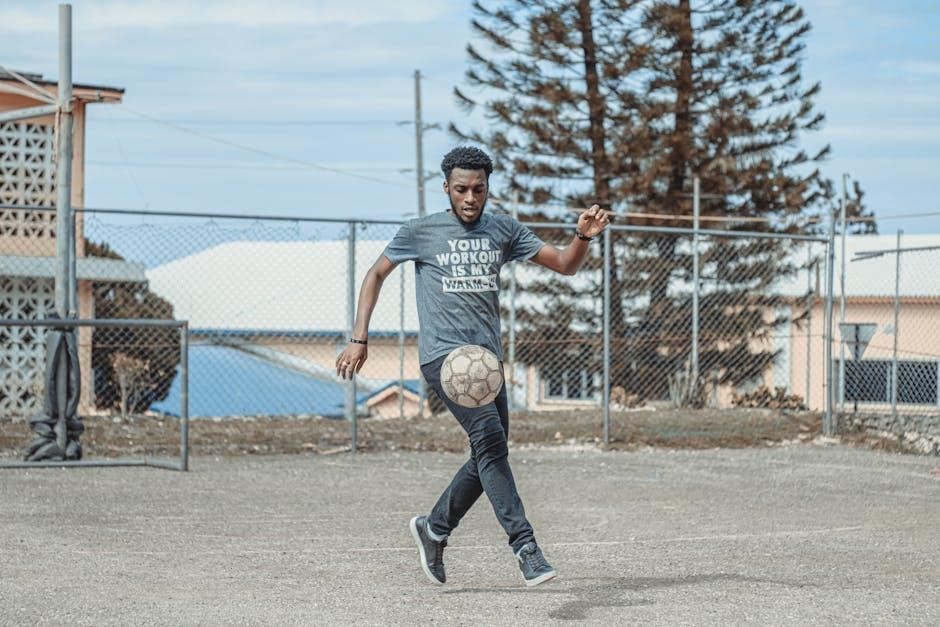
Game-Like Scenarios and Drills
Game-like scenarios and drills simulate real-game conditions, helping players apply skills under pressure and improve decision-making during competitions.
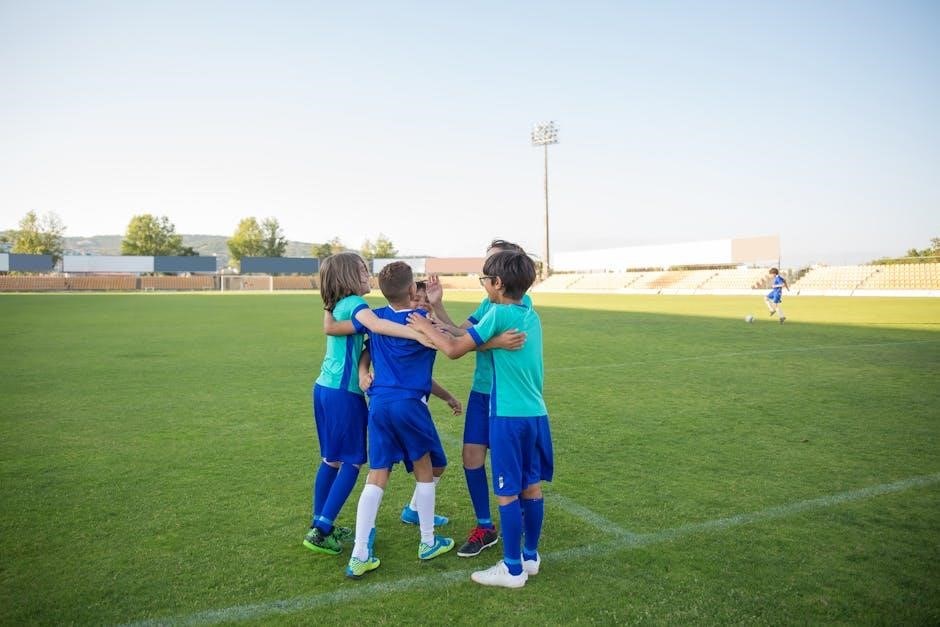
Small-Sided Games for Skill Application
Small-sided games are a key component of youth flag football practice plans, allowing players to apply skills in game-like scenarios. These games, such as 5-on-5 drills, enhance decision-making, teamwork, and strategic thinking. By simulating real-game conditions, players practice ball handling, passing, and flag-pulling techniques in a competitive yet controlled environment. Coaches can tailor these games to focus on specific skills, ensuring players are well-prepared for actual competitions. Small-sided games also promote physical activity and engagement, making practices both productive and enjoyable for young athletes.
End Zone Drills for Scoring Practice
End zone drills are designed to help players master scoring techniques in youth flag football. These drills focus on agility, speed, and precision, simulating game scenarios where players must navigate to the end zone. Activities like the “Running Back Corner Drill” and “Team Handoff Drill” allow players to practice scoring plays while avoiding defenders. Coaches can incorporate cones or small obstacles to enhance challenge and realism. These drills not only improve scoring efficiency but also build confidence and teamwork among young athletes, preparing them for competitive gameplay.
Age-Specific Practice Plans
Age-specific practice plans tailor activities to developmental stages, ensuring engaging and effective skill development for 5-6, 7-10, and 11-14 year olds with detailed drills and structured sessions.
Plans for 5-6 Year Olds
Practice plans for 5-6 year olds focus on basic skills like ball handling, flag pulling, and simple passing. Drills are short, engaging, and emphasize fun. Activities include introductory games, relay races, and fundamental movement skills. Coaches use visual cues and positive reinforcement to build confidence. Sessions are divided into small groups to maximize participation. The goal is to create a positive first experience with flag football, fostering teamwork and a love for the sport while developing essential motor skills and coordination.
Plans for 7-10 Year Olds
Practice plans for 7-10 year olds build on foundational skills, introducing more complex drills and team strategies. Sessions focus on improving passing accuracy, flag pulling techniques, and basic offensive/defensive formations. Age-appropriate challenges, such as timed drills and small-sided games, enhance skill development. Coaches emphasize teamwork, communication, and sportsmanship. Practices are structured to maintain engagement while gradually increasing physical and mental demands. The goal is to prepare young athletes for game-like scenarios, fostering both individual growth and team cohesion in a supportive environment.
Plans for 11-14 Year Olds
Practice plans for 11-14 year olds focus on advanced skill refinement and strategic play. Drills emphasize precise passing, evasive maneuvers like spin and juke moves, and defensive techniques. Coaches incorporate game-like scenarios, such as end zone drills and scrimmage variations, to simulate real competition. Players learn to read defenses, execute complex routes, and improve flag pulling accuracy. Teamwork and tactical awareness are prioritized, preparing athletes for competitive play while fostering leadership and decision-making skills in a dynamic, challenging environment.
Nutrition and Recovery for Young Athletes
Proper nutrition and recovery are vital for young athletes, focusing on balanced meals, hydration, and post-practice recovery to support growth and performance in flag football.
Pre- and Post-Practice Nutrition Tips
Proper nutrition is key for young athletes’ performance and recovery. Pre-practice meals should include complex carbs, lean proteins, and healthy fats, while staying hydrated is essential.
Post-practice, recovery snacks rich in carbs and protein help replenish energy stores. Avoid sugary foods and encourage balanced diets to support growth and endurance in flag football.
Hydration Strategies
Hydration is crucial for young athletes’ performance and safety. Encourage players to drink water 30 minutes before practice and every 15-20 minutes during sessions.
Coaches should monitor hydration levels and remind athletes to avoid sugary drinks. Educate teams on the importance of proper hydration to prevent fatigue and heat-related issues.
Urine color can indicate hydration levels—pale yellow means well-hydrated. Make water breaks routine to ensure optimal energy and focus during flag football practices.
Safety Precautions and Injury Prevention
Ensure proper warm-ups, equipment checks, and injury prevention strategies to create a safe environment for young athletes during flag football practices and games.
Proper Warm-Up Techniques
A well-structured warm-up is crucial for injury prevention and performance. Begin with light cardio such as jogging or jumping jacks to increase heart rates. Dynamic stretches like high knees, leg swings, and arm circles improve flexibility and mobility. Incorporate sport-specific movements, such as lateral shuffles and carioca drills, to prepare for flag football actions. Ensure proper form and technique during drills to reduce injury risks. Allocate 10-15 minutes for warm-ups, progressing from general to specific exercises. This routine enhances readiness and safety for young athletes, setting the foundation for effective practice sessions.
Equipment Safety Checks
Ensure all equipment meets safety standards to prevent injuries. Flags must be securely attached and easily removable. Mouthguards should be mandatory for all players. Check for proper footwear with non-metal cleats. Inspect the playing field for hazards and ensure goalposts are stable. Verify that balls are the correct size and inflation. Conduct regular checks on helmets and pads, if used, for any damage. Ensure all players have proper fitting equipment to avoid discomfort or injury risks. Safety checks should be performed before every practice and game to maintain a secure environment for young athletes.
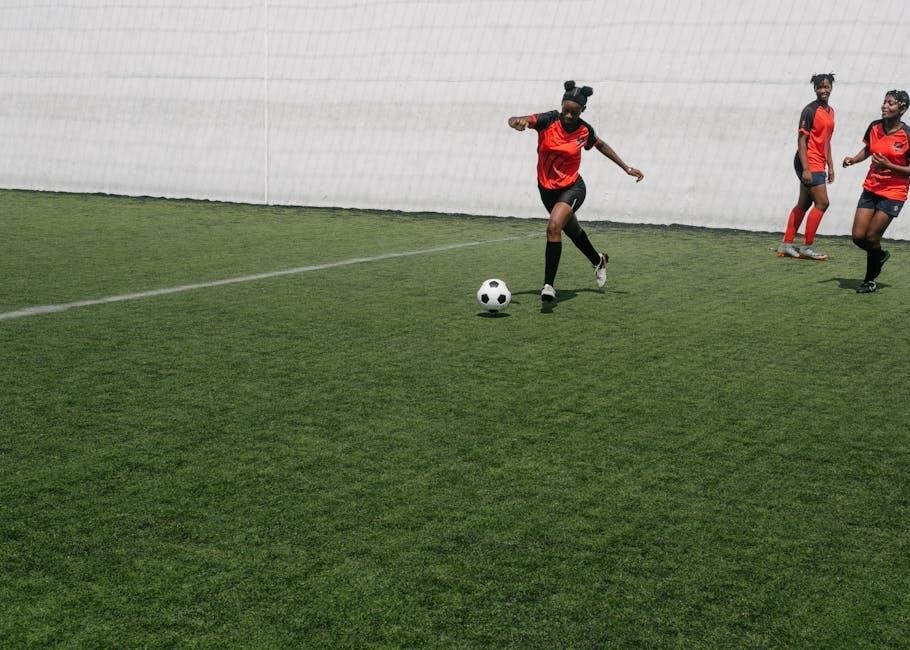
Mental Preparation and Team Building
Mental preparation and team building are crucial for youth flag football success, fostering confidence, focus, and collaboration among players to enhance performance and camaraderie.
Building Team Morale
Building team morale is vital for youth flag football success. Positive reinforcement, recognition of effort, and fun activities foster a supportive environment. Incorporate team-building exercises like icebreakers or group drills to encourage camaraderie. Celebrate small victories and emphasize teamwork over individual performance. Creating a positive atmosphere helps players stay motivated and engaged, leading to improved collaboration and overall performance on the field. Ensure practices are enjoyable and inclusive, allowing every player to feel valued and connected to the team’s goals.
Mental Toughness Exercises
Mental toughness exercises are crucial for youth flag football players to build resilience and focus. Drills like pressure scenarios and skill challenges help players stay calm under stress. Teach techniques to maintain composure during setbacks and encourage positive self-talk; Incorporate activities that simulate game-like intensity to prepare players mentally. These exercises foster confidence, discipline, and perseverance, enabling young athletes to perform better in competitive situations. Strengthening mental toughness helps players overcome obstacles and stay motivated throughout the season.
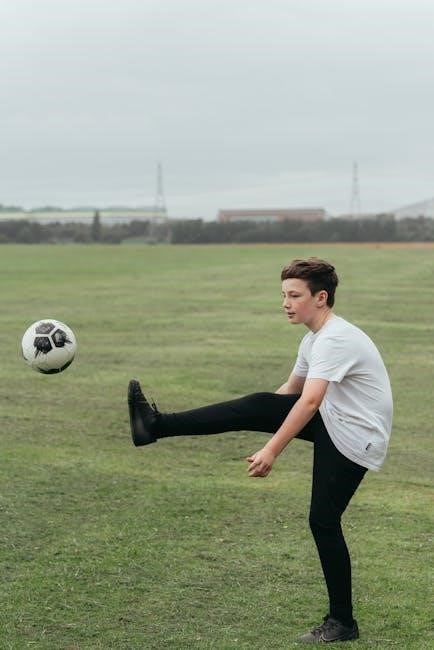
Practice Plan Templates and Resources
Downloadable PDF templates and online tools provide structured frameworks for creating customized practice plans, ensuring efficiency and organization for youth flag football coaches.
Downloadable PDF Templates
Downloadable PDF templates offer coaches a structured framework for creating effective practice plans. These templates often include pre-designed drills, warm-up routines, and skill development exercises tailored for youth flag football. Many templates, such as the NFL_Flag_SD_Play_60_Practice_Plan and Colts.xlsx, provide age-specific drills and game-like scenarios to enhance player growth. Coaches can customize these templates to fit their team’s needs, ensuring practices are organized and efficient. PDF templates are a valuable resource for coaches looking to streamline their planning process and focus on developing their players’ skills effectively.
Online Tools for Customizing Plans
Online tools provide coaches with flexible solutions to create and customize practice plans. Platforms like the YMCA’s Coaching Flag Football course offer digital resources, including the Practice Builder tool, which allows coaches to select drills, games, and activities tailored to their team’s needs. These tools often include pre-designed templates and the ability to upload custom drills, making it easy to adapt plans for different age groups and skill levels. Online resources also enable coaches to share plans with assistants and players, fostering collaboration and ensuring everyone is aligned.
Effective practice plans are key to fostering skill development and teamwork in youth flag football, ensuring a fun and competitive experience for young athletes.
Final Tips for Coaches
Coaches should emphasize a structured warm-up, skill-focused drills, and game-like scenarios to maximize player development. Encourage hydration, safety, and teamwork throughout practices. Keep sessions engaging with varied activities to maintain player interest and energy. Provide constructive feedback and celebrate progress to build confidence. Adapt drills to suit age groups and skill levels, ensuring inclusivity and fun. Stay organized with detailed practice plans and communicate clearly with players and parents. Foster a positive environment that balances learning and enjoyment, helping young athletes grow both on and off the field.
Continuous Improvement Strategies
Regularly review and update practice plans to reflect player progress and feedback. Utilize downloadable PDF templates and online tools to customize drills and adapt to team needs. Focus on refining fundamental skills through repetition and varied exercises. Incorporate player feedback to identify areas for growth and adjust strategies accordingly. Stay updated with the latest coaching resources and techniques to ensure practices remain engaging and effective. Continuous adaptation ensures players develop consistently and prepares them for game-day scenarios.
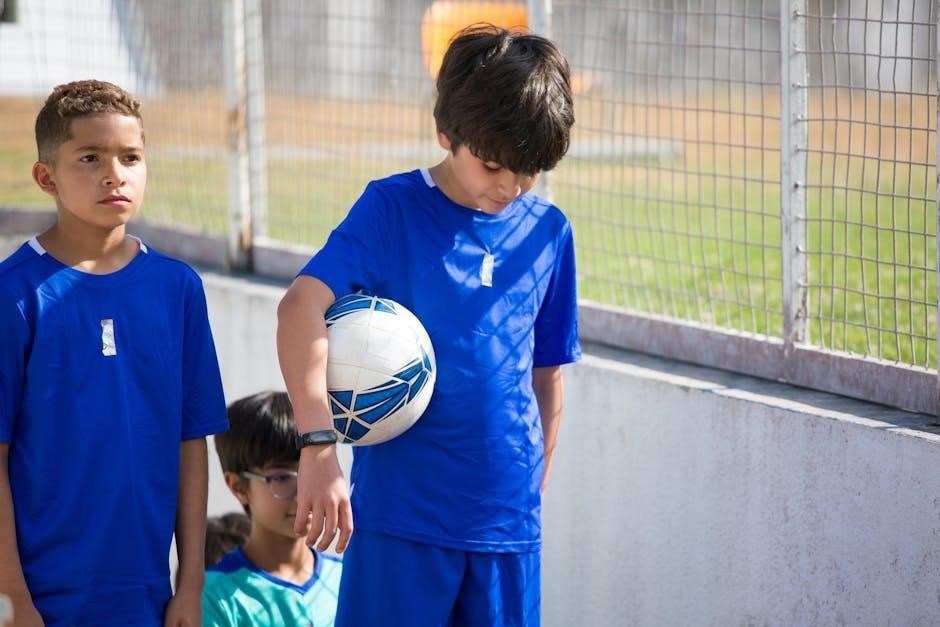
No Responses